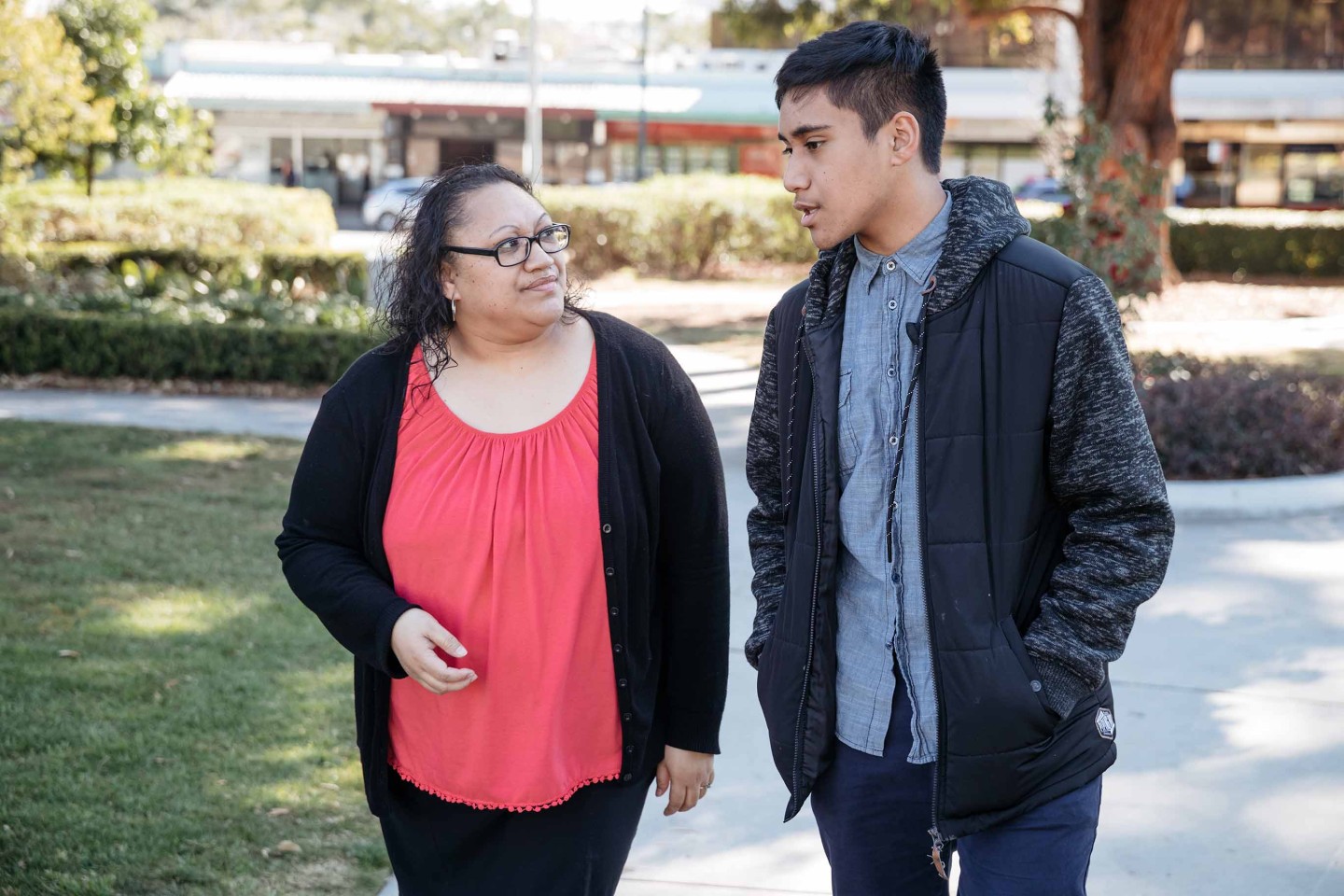Young adulthood is all about navigating new experiences and making sense of them. It’s a time of growth and exploration that often involves big transitions. These transitions can feel exciting and full of potential, but they can also feel overwhelming and stressful. Examples of changes and transitions that often happen during young adulthood are:
- leaving school
- leaving, or returning, home
- getting a job
- starting further study
- developing more serious/stable romantic relationships
- navigating new and changing friendships
- travelling
- moving to a new city or country
When young people experience change, it can challenge their ideas about reaching goals and sense of control over their future. You can support your young person and help them build the skills they need to thrive when transitions are tough for them to navigate.
Here are some things to keep in mind...
As young adults navigate transitions and test out new directions, they are also developing skills that will serve them well throughout adulthood. This means they need space to experiment – to learn by trial and error, even if the outcomes are uncertain.
As a parent or support person, you have an important role to play in supporting this exploration that is important in young adulthood, but the guidance you offer now might be different to the guidance given when they were younger. Here’s some things to consider:
- Transitions can come with mixed emotions. For instance, leaving school can be exciting, but it involves stepping away from supportive teachers, friends and structured days and into a world of less predictable options. The contrast between the known and the unknown can make transitions feel abrupt or confusing for young adults, even if they’ve been looking forward to them.
- Your young person’s experimentation might challenge expectations or hopes you hold for them. Exploring different paths is an important developmental process. You may have heard the saying ‘it’s the journey, not the destination’. This describes decision making in young adulthood well; highlighting that the process of weighing up options, making decisions, and changing one’s mind may be more important than where those decisions take them.
- If you have more than one child, it can be helpful to remember that the journey may be different for each of them.
- Different cultures and communities have their own ways of supporting young people as they move into adulthood. These approaches reflect unique traditions, values, and understandings about what independence and responsibility look like, and how those changes are best navigated.
Transitions in context
The choices young adults make as they map out their pathway to adulthood can be impacted by what’s happening around them, such as:
- The cost of living and rental shortages, which can mean young adults need to live at home for longer or return home after living away for some time
- The need for more qualifications for employment compared to previous generations. This involves time spent on further study that can increase financial pressures, meaning they might delay decisions like moving out.
- Social media content can contribute to unrealistic ideas about what ‘success’ looks like. This may lead to comparisons to others and contribute to young adults being hard on themselves.
- ‘Family, cultural, and community expectations often shape the decisions young adults make. Responsibilities, values, and life circumstances can all influence the paths they choose as they navigate this stage of life’
It can be difficult to know how to support your young person while negotiating a more adult-to-adult relationship and respecting their growing independence. The good news is that there are still lots of ways you can play a valuable role in equipping them to navigate the transitions ahead.
Supporting your young person
As a parent, you can remind your young person that there is no one ‘right’ pathway.
- Let them know that young adulthood is the perfect time for experimenting with new ideas and experiences or emphasise that there are almost always multiple paths to their goals.
- Remind your young person to focus on what they can control – this can help young adults feel able to direct their life pathway.
- It’s important to keep in mind that family, cultural values and intergenerational wisdom often play a role in shaping the choices young adults make.
Acknowledge how they feel, and ask what they need to feel supported during this transition.
- This may change from week to week, so create time and space for conversations.
- Acknowledge past patterns – some young adults may crave advice, whereas others want to learn by experience.
- Accept that they may not want your help (even if you feel like it would make a difference), or that they may want help from someone else.
Support doesn’t always have to look like ‘help’ – instead, it can look like being curious about your young person’s life
- Check in regularly, unless your young person has specifically asked you not to.
- Avoid sentences that start with ‘you should...’ (especially if you’re talking about where you think your young person should ‘be by now’).
- Instead, you could try starting with phrases like ‘Have you thought about...’, ‘I was wondering about...’ or ‘What do you think about...’
Make it clear that it’s OK to ask for help
- Your young person may be more reluctant to talk about their struggles as they get older
- Remind them that no one ever gets ‘too old’ for support from their family, and that you are offering support because you care, not because they are lacking in any way
- Be flexible around what this may look like as your young person’s circumstances change
- When they do ask for help, aim to respond positively. You might say something like ‘Thanks for coming to me with that. Would it be helpful if we...’ or ‘That is big stuff to be dealing with on your own. I’m really glad you’ve opened up to me...’
It’s okay to provide material support, like help with bills, food or rent, if you can. It’s unlikely that this will prevent your young person from becoming independent later. If you do provide material support, make sure that both you and your young person have a shared understanding of expectations.
Offer help with learning practical life skills, such as:
- setting up a budget
- meeting tax obligations
- setting up ambulance cover and/or health insurance
- accessing government services, like Medicare or Centrelink
- learning domestic skills, like meal planning or home maintenance
- understanding work requirements
- filling in forms or reading contracts
Looking after yourself
Major transitions can be a source of worry for parents– the urge to protect your child doesn’t disappear when they turn 18. You may also not feel comfortable about their decisions. On the other hand, you might feel a sense of freedom or relief as your young person takes steps towards independence.
When your child becomes a young adult, it may feel like you’re a bystander while they make decisions. Balancing respect for their decisions and their growing independence can be difficult, especially when their decisions may impact on your own future.
Looking after yourself can help you and your young person thrive.
- Be kind to yourself – you are navigating a new stage of parenting which can come with ups and downs
- Connect with other parents and carers with young adults – it can help to chat with someone who has been through this new stage of parenting
- Try not to compare your young person to others known to you who are making different choices or taking different pathways
- Take the time to rediscover your own interests, and nurture your own relationships
- Support yourself through self-care
- Spending time with family, loved ones, or engaging in faith and community networks can help you feel supported
Getting help
Taking positive steps takes courage but can make a positive difference. If it seems like they are having a hard time, encourage them to take steps to reach out for help.
Talking things through with a trusted person or professional, such as via eheadspace, can offer new perspectives and help your young person build confidence.
The headspace Clinical Reference Group oversee and approve clinical resources made available on this website.
Last reviewed December 2025
This content was developed in association with the Parenting Research Centre.
Dietrich J, Salmela-Aro K. Emerging adults and work: a model of phase-adequate engagement. In: Arnett, JJ, editor. The Oxford handbook of emerging adulthood. 1st edition. Oxford University Press; 2015. p. 334–345.
Fingerman K, Yahirun J. Emerging adulthood in the context of family. In: Arnett JJ, editor. The Oxford handbook of emerging adulthood. 1st edition. Oxford University Press; 2015. p. 163–176.
Frameworks Institute (US). Reframing adolescence and adolescent development [Internet]. US: Frameworks Institute; 2020. Available from: https://www.frameworksinstitute.org/toolkit/the-core-story-of-adolescence/
Goldsmith J. Emerging adults’ relationships with their parents. IL: Family Institute at Northwestern University; 2018. 6 p.
Hochberg Z, Konner M. Emerging adulthood, a pre-adult life-history stage. Frontiers in Endocrinology. 2020 Jan 14;10:1–12.
Marshall AE, Butler K. School-to-work transitions in emerging adulthood. In: Arnett, JJ, editor. The Oxford handbook of emerging adulthood. 1st edition. Oxford University Press; 2015. p. 316–333.
O’connor M, Sanson AV, Toumbourou JW, Hawkins MT, Letcher P, Williams P, Olsson C. Positive development and resilience in emerging adulthood. In: Arnett, JJ, editor. The Oxford handbook of emerging adulthood. 1st edition. Oxford University Press; 2015. p. 601–614
Seiffe-Krenke I. Leaving home: antecedent, consequences and cultural patterns. In: Arnett, JJ, editor. The Oxford handbook of emerging adulthood. 1st edition. Oxford University Press; 2015. p. 177–189.
Vassallo S, Smart D, Price-Robertson R. The roles that parents play in the lives of their young adult children. AU: Australian Institute for Family Studies; 2009. 7 p.
Get professional support
If you feel you need help there are a range of ways we can support you.


